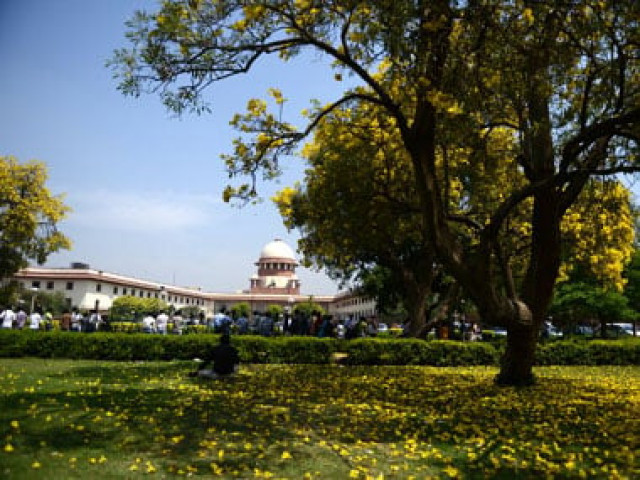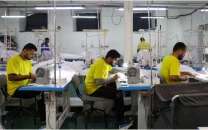India's top court says privacy is a fundamental right
Indian Supreme Court set up special bench after govt's Aadhaar biometric programme was challenged

Indian Supreme Court. PHOTO: REUTERS
Privacy is not explicitly mentioned in the Indian constitution, and the government has argued that the country's 1.25 billion citizens cannot expect an absolute right to it.
India's Supreme Court to consider abortion plea from 10-year-old rape victim
But in a brief statement on Thursday, Chief Justice JS Khehar said privacy was "protected as an intrinsic part of Article 21 that protects life and liberty". The judges were unanimous, he said.
The Supreme Court set up a special bench to rule on the issue after a legal challenge to the government's Aadhaar biometric programme, which has recorded the fingerprints and iris scans of more than one billion Indians.
Aadhaar was set up as a voluntary scheme to streamline benefit payments to millions of poor people and reduce fraud. But in recent years it has become compulsory for a growing number of services, including opening a bank account and paying taxes.
Opponents say that its use for what are effectively essential services means their right to privacy is increasingly being violated.
Prime Minister Narendra Modi's government has rejected suggestions that the programme, set up in 2009, poses a threat to civil liberties, despite personal data being leaked in security breaches.
In May India's Attorney General Mukul Rohatgi rejected suggestions that Indians could refuse to provide their iris scans or fingerprints to the government, telling a court "the concept of absolute right over one's body was a myth".
Udayaditya Banerjee, one of the lawyers challenging the Aadhaar Act, said it gave the state unacceptable powers of surveillance.
"One of the premises for us to challenge Aadhaar was that it was violating the privacy of individuals. There was potentiality of a surveillance state being created," he told reporters outside the court.
"We always believed we had a right to privacy and today the Supreme Court unequivocally stated that."
India's top court suspends ban on trade in cattle for slaughter
During the hearings the nine-member Supreme Court bench recognised the risk of personal information being misused, and the challenge of protecting such private data in the internet era. But the judges also acknowledged there must be restrictions within reason on individual privacy.
Constitutional law scholars had said the case would be a test of Indian democracy, with potentially far-reaching consequences if individuals were allowed to challenge laws on the basis of individual rights.
In an article published by the Times of India last month, two legal experts argued that it would be one of the world's most important legal decisions this year.
"Societies far beyond India will be watching to see what it decides," wrote Eben Moglen and Mishi Choudhary. "India will, as a result of the Supreme Court's judgement, take the lead among democracies in recognising and enforcing its citizens' fundamental right to privacy, or fall in line behind despotic societies in destroying it."
Lawyer Prashant Bhushan said the judgement would have an impact on the Aadhaar programme but it was not yet clear how.
"Any fundamental right is subject to reasonable restrictions by law. Whether the Aadhar Act imposes unreasonable restrictions will have to be examined," he told reporters outside the court.
The full judgement is expected to be published later on Thursday.



















COMMENTS
Comments are moderated and generally will be posted if they are on-topic and not abusive.
For more information, please see our Comments FAQ